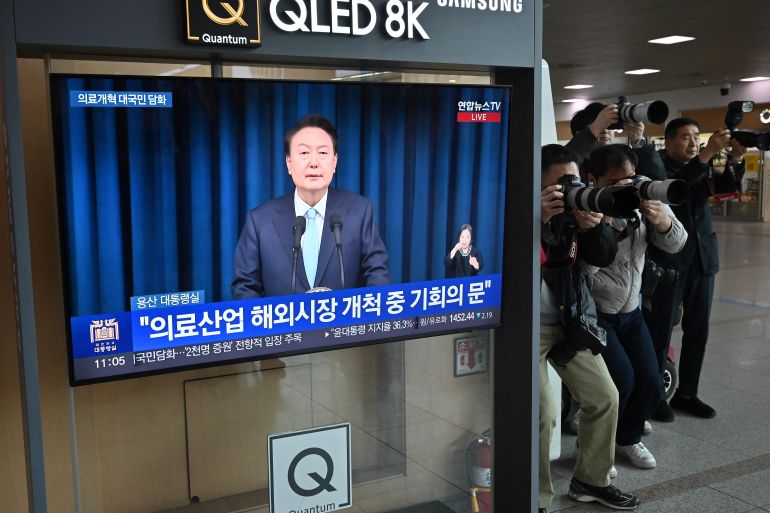South Korea’s Yoon accuses doctors of running ‘cartel’ as strike drags on
Yoon pledges not to back down on plans to increase medical school admissions.

South Korean President Yoon Suk-yeol has pledged not to back down on plans to increase medical school admissions as he accused striking doctors of operating as a “cartel”.
In an address to the nation on Monday, Yoon said the planned addition of 2,000 medical school places was the minimum needed.
Keep reading
list of 3 itemsThe high cost of being a whistleblower in China
OpenAI debuts voice cloning tool, but deems it too risky for public release
“The number 2,000 is not a random figure we came up with. We have thoroughly reviewed relevant statistics and research and reviewed present and future medical situations,” Yoon said, adding that the government’s reforms aimed to create “a medical environment where all people can receive treatment with a peace of mind”.
Yoon said doctors opposed to the plans should stop “making threats” and present a “unified blueprint with clear scientific reasoning”.
“If a more valid and reasonable plan is brought forward, we can discuss as much as they want,” he said.
Some 12,000 junior doctors in South Korea have been on strike since early February over the proposals, forcing hospitals to cancel treatments and surgeries.
South Korea’s government has argued that the reforms are necessary to alleviate staff shortages and manage the country’s rapid transition to an aged society.
South Korea had 2.6 doctors per 1,000 people in 2022, according to the Organisation for Economic Co-operation and Development (OECD), well below the average among developed nations.
Trainee doctors argue that the medical system is not equipped to handle such a steep increase in new recruits and that medical services will suffer as a result.
Doctors participating in the walkout face the risk of losing their medical licences after the government last month began taking steps to suspend them.
Yoon urged the doctors to return to work before the process to suspend their licences was complete, saying collective action should only be considered “when I do not keep my promises”.
Yoon also expressed regret at the inconvenience caused to the public, saying he was sorry he had been unable to “quickly resolve the inconveniences of the people”.
Public approval of Yoon has declined as the strike has dragged on, with just over 36 percent of South Koreans expressing a positive view of the president in a RealMeter poll released on Monday.
South Korea will hold parliamentary elections next week that will be crucial to Yoon’s chances of avoiding lame-duck status in the remaining three years of his five-year term.